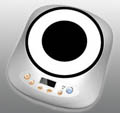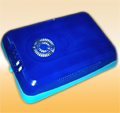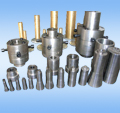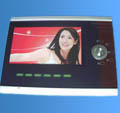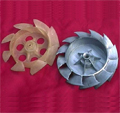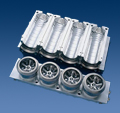

| Address: | PDS Enterprise Inc. 1650 West Artesia Blvd, Suite 278 Gardena, CA90248 |
| Phone: | 1-843-408-0142 |
| Email: | pdsenterprise@gmail.com sales@coolprototyping.com |


Home>FAQ
235. Application of common plastic molding
ABS acrylonitrile - butadiene - styrene copolymer
Application: Vehicle, refrigerators, high-intensity tools (hair dryers, blenders, Food Processing machines, lawn mowers, etc.), telephone shell, typewriter keyboard, recreational vehicles such as golf carts and jet skis cars.
rapid prototyping process conditions: Drying: ABS material has a moisture absorption, require drying before processing. Recommended drying conditions for at least 80 ~ 90 drying under 2 hours. Material temperature should be guaranteed less than 0.1%.
Melting temperature: 210 ~ 280 ; recommended temperature: 245 .
Mold Temperature: 25 ... 70 . (Die temperature will affect the plastic finish, while lower temperatures lead to finish lower).
Injection pressure: 500 ~ 1000bar. Injection speed: in high speed. Chemical and physical properties: ABS is acrylonitrile, butadiene and styrene three monomers. Each of the monomers with different properties: acrylonitrile have high strength, thermal stability and chemical stability; butadiene and toughness and impact resistance; styrene with easy processing, high gloss, and strength. From the morphological point of view, ABS is an amorphous material.
Polymerization of three monomers had a two-phase ternary copolymer, a styrene - acrylonitrile continuous phase, polybutadiene rubber dispersed phase. ABS depends on the characteristics of the ratio of monomers and the molecular structure of two phases. This can be in product design with great flexibility, and the resulting market hundreds of different quality ABS material. These different quality materials offer different characteristics, such as moderate to high impact resistance, from low to high surface gloss and high heat distortion.
ABS material offers superior workability, appearance, low creep and excellent dimensional stability and high impact strength.
Melting temperature: 240 ~ 300 ; the general characteristics of materials should not exceed 310 , fire-retardant properties for a material should not exceed 270 .
Mold temperature: for non-enhanced material 30 ~ 40 , the thin wall or large area of components for the 80 ~ 90 , for enhanced materials 90 ~ 100 . Increase in temperature will increase the material's crystallinity. Precise control of mold temperature on the PA12 is very important.
Injection pressure: maximum to 1000bar
Injection speed: speed
 We are constantly looking for new products in order to grow our business and Invention Home has enabled us to streamline that process much more quickly.
We are constantly looking for new products in order to grow our business and Invention Home has enabled us to streamline that process much more quickly. Marsha Dunmyre
CA, U.S.A
Cool Prototyping Copyright 2008-2009 © All Rights Reserved. Rapid Prototyping

